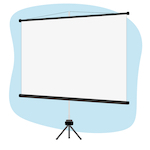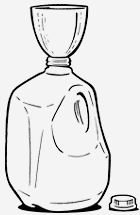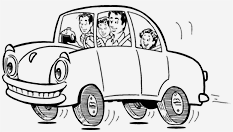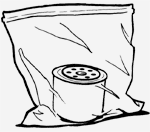Lesson Material
Materials available to ESL programs include:

Student Lesson Books
Student lesson books for all students: we create versions for each local area, including lists of where to take oil and filters for recycling and also information on curbside recycling programs where available. Each book includes 3 versions of the storyline, for beginning to high-intermediate students. You can download a ![]() sample lesson here.
sample lesson here.

Pens
Soluna Outreach Solutions Provides Message pens for all students: Pens include phone numbers and websites for recycling information.

Teacher Packets
Teacher packet: Print version of many of the resources available on this website, plus local brochures and fliers where available.

Realia
Physical items illustrating the basic vocabulary words.

Teaching Tools
Overheads and power points of all lesson materials.
Oil & Water Activity
Landfill Drawing
Credits:
The lesson was designed by June Michaels.
Pictures are by Joal Morris http://www.joalmorris.com/
Resources and information for local versions have been gathered by Connie Cloak and Hugo Mata.
Special Thanks
Teachers often comment on how helpful it is to have sets of realia. Our budget for these is stretched by the generosity of the following:
- Adapt Consulting www.adaptadspecialty.com provided funnels, and also gives us a great deal on the cool message pens for students.
- Hansel Ford of Santa Rosa www.hanselford.com gave us a special deal on filters.
- Thanks also to all our friends, neighbors and freecycle (www.freecycle.org ) members who save milk jugs and empty oil bottles for us.
Why Recycle Oil and Filters?
Used motor oil causes serious harm to the environment. Recycling oil and filters not only protects water, soil and air from pollution, but also reduces the negative impacts of extracting and refining crude oil. These fact sheets provide details that teachers and students often find interesting. Teachers of more advanced classes may find these useful as classroom materials. Word versions are provided in case you would like to copy portions of them for use in classroom exercises.
SCROLL TO READ: Facts About Used Motor Oil or Filter Facts
Facts About Used Motor Oil
- One quart of used motor oil can contaminate 250,000 gallons of water. Or:
- One gallon of used motor oil can contaminate one million gallons of water: a year’s supply for 50 people!
- One oil change from one car engine can create an eight-acre oil slick.
- Oil films on water block sunlight and oxygen from reaching water plants and fish.
- The amount of used motor oil disposed of improperly by Do-it-Yourselfer auto mechanics every three weeks in the US. is about the amount of oil spilled by the Exxon Valdez super tanker in Alaska: 11 million gallons!
- One gallon of used oil that is re-refined will produce about 2½ quarts of lubricating oil. Producing the same amount takes 42 gallons of crude oil.
- Re-refining used motor oil takes only 1/3 the energy of refining crude oil to lubricant quality.
- If all the used motor oil disposed of improperly each year by US Do-it-Yourselfers were recycled, it could produce enough energy to power 360,000 homes or provide 96 million quarts of high-grade motor oil.
- If all the waste oil generated in the US each year were re-refined, we would save 1.3 million barrels of oil per day, or half the output of the Alaska pipeline.
- 40% of the pollution in America’s waterways is from used motor oil.
- Used motor oil often contains toxic metals such as lead, cadmium, arsenic, and chromium. These can seep into ground water when dumped on the ground or in the trash.
- Not recycling used motor oil causes not only environmental damage and a human health hazard: it’s also a missed opportunity to reduce our nation’s dependence on foreign oil.
- When oil is taken to a Used Oil Collection Center, it is picked up by a licensed hauler. It is then either used as fuel in special non-polluting burners, or re-refined into new oil.
- The only right way to dispose of used motor oil is to recycle it. Putting it in the trash, on the ground, or down the drain causes pollution and is illegal.


Filter Facts
- Used oil filters are a hazardous waste if not recycled
- It is illegal to throw them away (drained or undrained), homeowners are not exempt
- On average, an oil filter weighs 1 pound
- An average oil filter has a pound of steel
- An undrained used oil filter can contain up to a quart of oil
- Recycling one ton of filters yields 1,700 pounds of steel, 30 gallons of used oil (3-4 gallons/55 gallon drum) and saves 10 cubic yards of landfill space.

